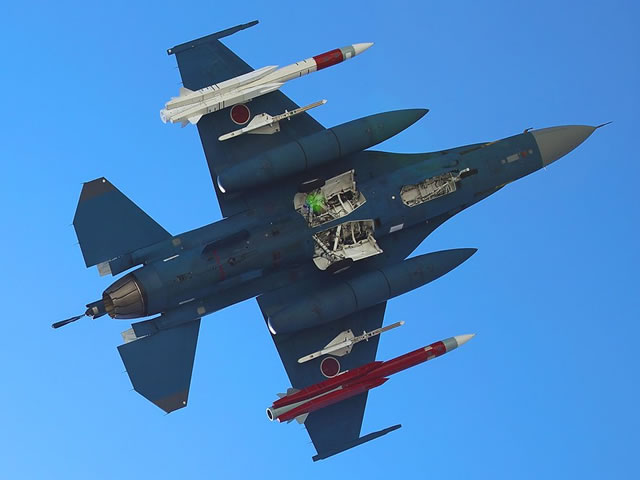Breaking news
Japan to Produce and Procure XASM-3 Supersonic Anti-Ship Missile in 2018.
| 2017
|
|
| a |
|
Naval Forces News - Japan
|
|
|
|
Japan to Produce and Procure XASM-3 Supersonic Anti-Ship Missile in 2018
|
|
According to Japanese news site Yomiuri Online, Japan's next geenration XASM-3 supersonic anti-ship missile will enter mass production in 2018. The missile will also be officially introduced with the Japan Air Self-Defense Force (JASDF), it will then be called ASM-3. The Japanese MoD likely conducted a test earlier this year as we previously reported.
|
|
|
|||
 Two XASM-3 missiles fitted on a Japan Air Self-Defense Force F-2 Fighter during recent tests (May 2017). Picture via twitter @MR2AW11SP Two XASM-3 missiles fitted on a Japan Air Self-Defense Force F-2 Fighter during recent tests (May 2017). Picture via twitter @MR2AW11SP |
|||
|
|
|||
|
According to the Japanese MoD, aerodynamic and captive carry tests on F-2 fighters had been completed in 2015 and the missile was then in the final stages of prototype manufacturing.
Yomiuri Online says that ASM-3 is characterized as being "difficult to intercept" because of its speed and is an answer to the Chinese Navy (PLAN) recent "aggressive activities in the East China Sea". |
|||
|
|
|||
|
Video showing Japan Air Self-Defense Force F-2 Fighter fitted with two XASM-3 missiles. Video from maplef12
|
|||
|
|
|||
|
XASM-3 is capable of reaching Mach 3 speeds thanks to its ramjet engine fed by two air intakes (in a similar fashion to MBDA's Meteor air to air missile of to the French ASMP-A air-launched tactical nuclear missile). XASM-3 is flying close to sea level in the final stage of attack to reduce probability of detection and intercept.
XASM-3 basic specifications: Overall length: 5.25m Maximum speed: Mach 3 or more Firing range: 80nm (about 150km) or more Weight: 900kg Power: Integral Rocket Ramjet Navigation and seeker: inertial / GPS (intermediate stage) + active / passive seeker (terminal phase) We recently reported that a similar missile, the XSSM intended for the Japanese Navy (JMSDF) was also tested earlier this year. |
|||
|
|
|||
 Two XASM-3 missiles fitted on a Japan Air Self-Defense Force F-2 Fighter during recent tests (May 2017). Picture via twitter @durum_semolina Two XASM-3 missiles fitted on a Japan Air Self-Defense Force F-2 Fighter during recent tests (May 2017). Picture via twitter @durum_semolina |
|||


























